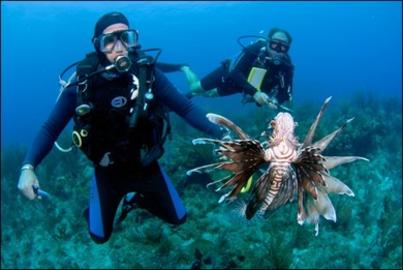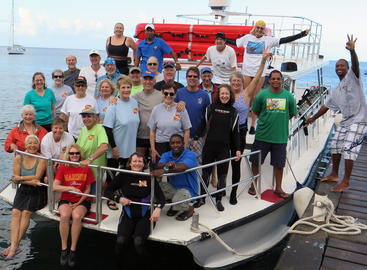REEF teamed up with the Coral Restoration Foundation (CRF) during the second week of September to host the first-ever “Corals In & Lionfish Out,” a series of events to engage and educate the public while raising funds for coral restoration and invasive lionfish removal efforts in the Florida Keys. “Corals In & Lionfish Out” coincided with REEF’s Fifth Annual Key Largo Lionfish Derby, which was held at John Pennekamp Coral Reef State Park on Sept. 13.
If you haven't yet had a chance to check out REEF's 2015 Field Survey Trip Schedule, we encourage you to take a look. Visit www.REEF.org/trips to see the complete schedule, package details, trip leader bios, trip policies, and more. We hope you will join us!. Spaces are starting to fill up, and we want to make sure you don't miss this chance to take a "Dive Vacation that Counts".
Dive the great waters around Jupiter, Florida. We will dive Saturday, Sunday and Monday. Make 6 offshore boat dives. Trip includes 3 nights motel (double occ.), 3 days offshore diving with Jupiter Dive Center, and airfills.
Fish/Shark/Turtle ID classes are available prior to trip.
Easy for beginners.
Complete TWA REEF fish ID data sheets each day.
Dive the great waters around Jupiter, Florida and Blue Heron Bridge. We will dive Saturday, Sunday and Monday. Make 4 offshore boat dives and 4 dives at Blue Heron Bridge. Trip includes 2 nights motel (double occ.), 2 days offshore diving with Jupiter Dive Center, and airfills.
Each dive will be an opportunity to complete a TWA REEF fish ID sheet.
Fish/Shark/Turtle ID class is available prior to the trip for an additional cost and with advance notification.
Check in is 8 AM
Come join us for a drift dive on a deeper reef (<60 ft) and have the boat pick you up when you are done. 2nd dive will be on a shallower reef & might not be a drift dive (depends on conditions)
Call the Key Dives to reserve your spot at 305 664 2211
Key Dives is located at MM 80 at Bud N Mary's Marina.
We are very fortunate to host Dr. Benjamin Victor during our upcoming 100 Fish ID class on Thursday, Oct 2nd at 7 pm at REEF HQ. Dr. Victor will give a lecture on "New Information on Gobies & Blennies". The discussion will include where to find the different species & troublesome ID's (we can all use this help!).Dr. Victor is diving with us next week to collect goby & blenny specimens for his research to genetically define these species.
Fish ID lecture focusing on grunts: their habitats, diet, reproduction & cool facts; along with basic & advanced Fish ID reviews to help you correctly identify them while diving.
Fish ID lecture focusing on gobies: their habitats, diet, reproduction & cool facts; along with basic & advanced Fish ID reviews to help you correctly identify them while diving.
Visit: www.100fishid.com - Fish ID Tab to see the most common fish. Put your cursor on the fish to show the family & species name ( www.100fishid.com/#!gallery/c1pwt )
BLUE HERON BRIDGE SHORE DIVE at PHIL FOSTER STATE PARK, RIVIERA BEACH FL
Road trip to Blue Heron Bridge for a Shore Dive to find unusual critters: batfish, fly gurnards, sea horses, frogfish, jawfish.....
This is a 1 tank 90-120 minute shallow shore dive (<25 ft).
ENTER WATER 60-90 MINUTES BEFORE SLACK HIGH TIDE (1:33 pm on 11/14)
Carlos & I will be at BHB by 11:30 am to give an orientation. We will enter the water by 12 pm.
Attempt a 2 hour, 100 Fish ID dive, or do 2 tanks or snorkel on Alligator Ledge. Alligator Ledge has a high diversity of fish species and a huge abundance of each species. You have to push the fish out of the way to see the reef :) This is a shallow reef in 12-28 ft of water.


